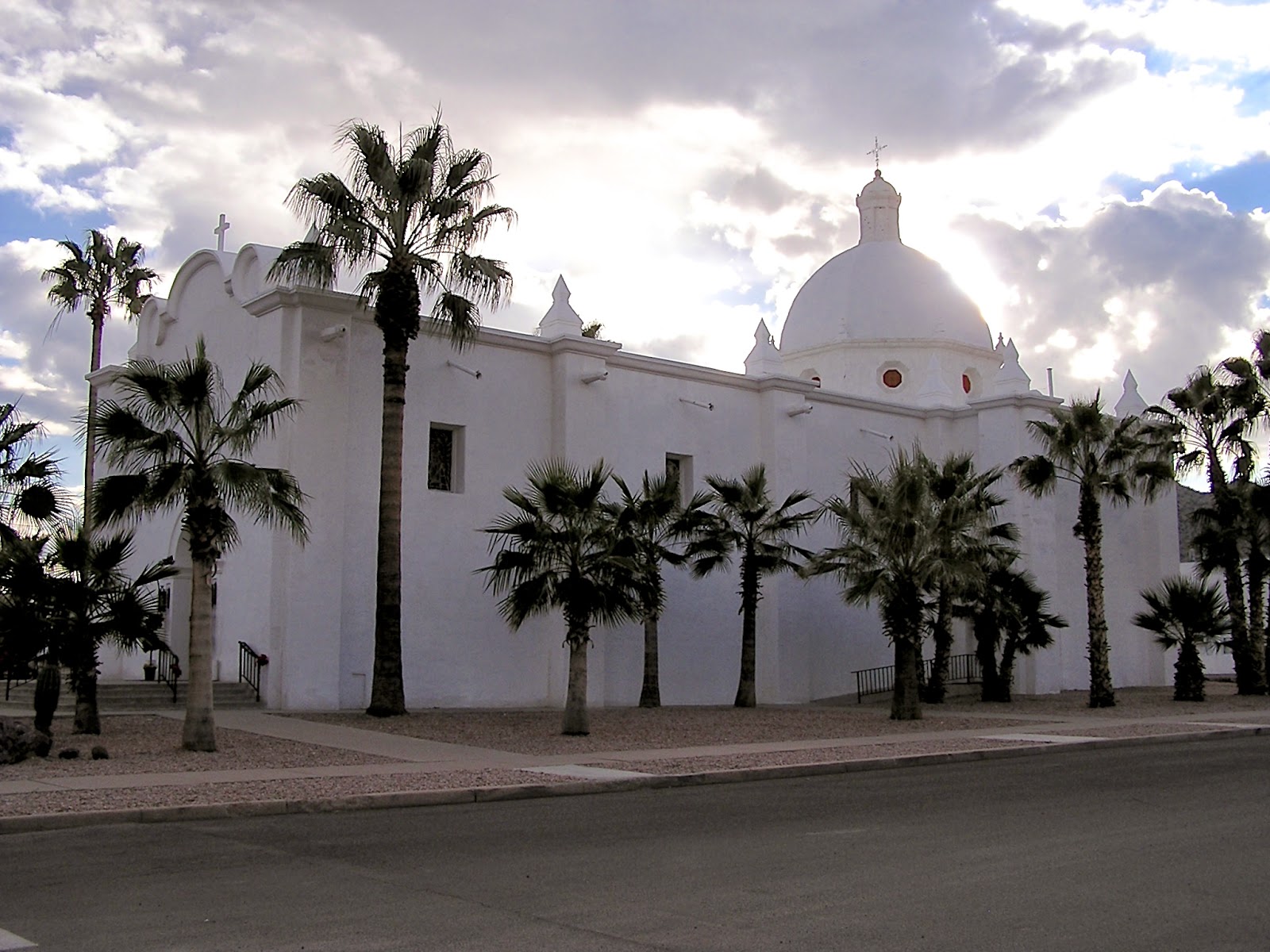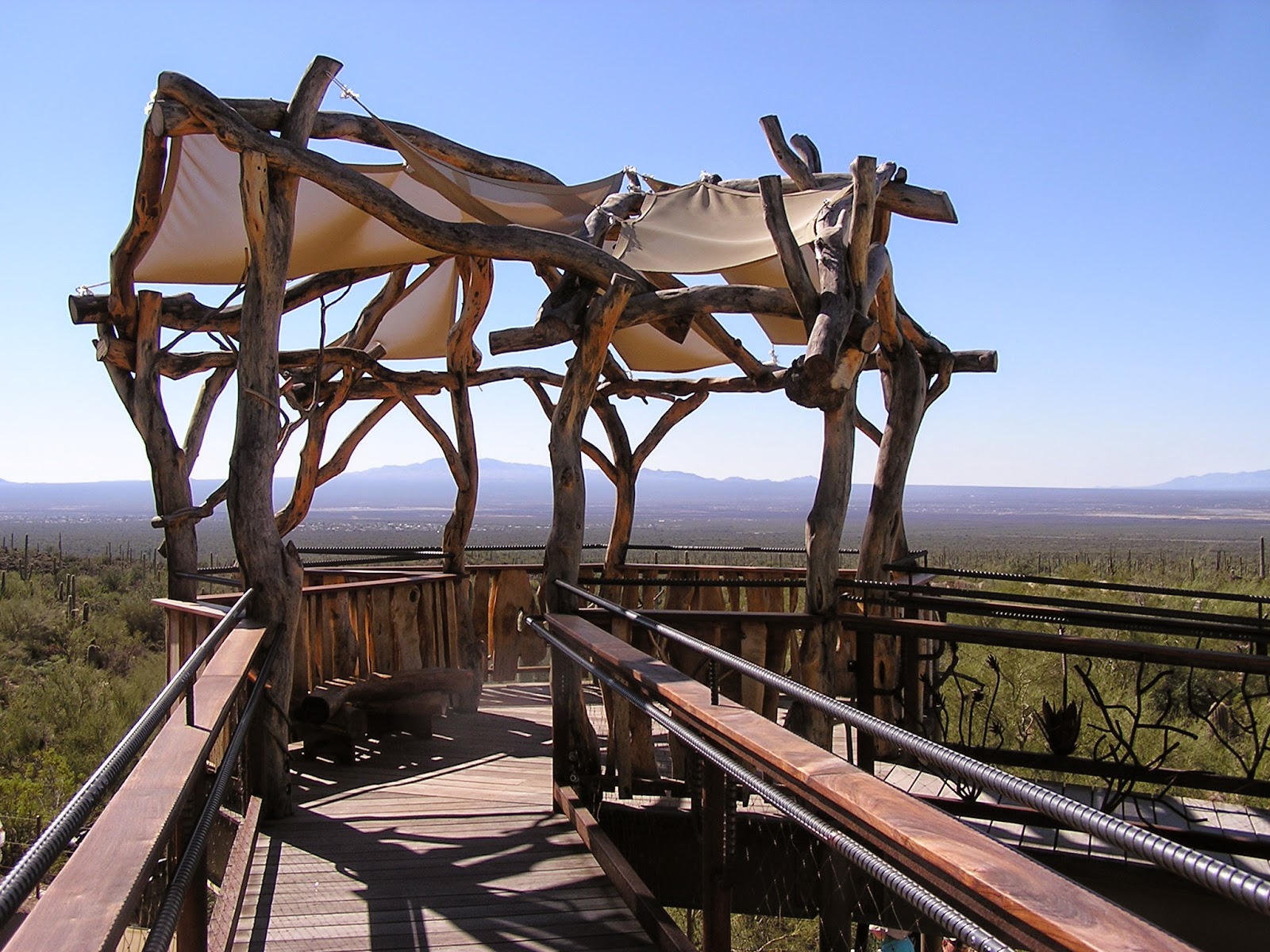written February 27, 2015
It is time for our next installment of
the Rolling JnJ's. On our way to Quartzsite in January, we, along
with friends Al and Carol Stevens, and Paul and Jan Kelpe, took “the
back way” and made a couple of stops that we forgot to tell you
about in the last blog. Instead of traveling the interstates (I-8 &
10) we drove Arizona Routes 85 and 86. In doing so we passed through
the town (actually an enormous Border Patrol intersection) called
Why. You are probably asking why the name Why? It is very simple
really. Arizona routes 85 and 86 come together here forming a Y
intersection. When Why petitioned the State to become a town
(designated place on the map) called “Y”, the State refused,
noting a regulation that the name of each “town” must contain at
least three letters. So, it didn't take too many board meetings for
the “founders” to change their request from Y to Why! Now that
is the kind of history lesson that keeps us on the road discovering.

We also made a little side trip to the
Tohono O'odham Cultural Center and Museum. Wow, what a different
Museum. This one is located on the Reservation and is staffed and
run by the Tohono O'odham people. The story they paint is “just a
little different” from the stories we learned in school from the
“White Man's” interpretation. They have a studio where they
teach college students how to handle and preserve their ancient
artifacts. Really quite intriguing and interesting. We spent that
evening and night in a town called Ajo (note the number of
characters).
 |
| Tohono O'odham Cultural Center and Museum |
|
 |
| Immaculate Conception Catholic Church in Ajo, Az. |
 |
| Ajo Town Plaza |
|
The next day we traveled south, almost
to the Mexican border, to the Organ Pipe Cactus National Monument,
stopping first at the Kris Eggle Visitor Center (a picture story will
follow). We drove a 22 mile “loop” through the park enjoying a
picnic and many beautiful vistas and other sights, including a huge
Organ Pipe Cactus that attempted to eat Julie. The Border Patrol
stopped by just to check on our safety. There is a huge
Border Patrol presence out here in the vicinity of the border. We
have passed through many BP check stations and so far they have
allowed Julie to proceed!
 |
| Caravanning with friends to Ajo |
 |
| The Visitor Center at Organ Pipe NM was named for this fine young National Park Service Ranger. This killing changed the way Rangers work, as they now carry guns for protection. |
|
|
 |
| A Mistletoe plant growing in a Palo Verde tree |
|
 |
| beautiful mountain silhouettes were all around us |
 |
| beginning the 22 mile Loop Drive in the park |
 |
| We are beginning to see the Organ Pipe Cactus |
 |
| some of the Organ Pipe Cactus are huge |
 |
| Al, Paul, and Jim taking a break |
 |
| a shady picnic stop on the Loop drive |
 |
| On a hike off the Loop Drive we could see this double arch - one smaller one right above the larger one |
 |
| Julie being eaten by a huge crested Organ Pipe Cactus (in her coordinating green hat!) |
After Ajo we spent the next night in a
town called Brenda (guess they couldn't find a Pam) to get all of our
tanks emptied and load the Monty with all the water she could hold
for our fortnight in the desert.
Now that we are back in Tucson we have
once again been taking in the local sights. We toured the DeGrazia
Gallery in the Sun. Julie remembers meeting Ted DeGrazia at his
Gallery and grounds when she lived in Tucson in the late 60's. He
was a quiet, friendly and slightly eccentric man. She has always
loved his art work and feels quite lucky to have met this very famous
(now deceased) artist.
 |
| The entrance gate and doors into the Gallery |
|
 |
| Cross sections of Saguaro Cactus line a path in the Gallery |
|
 |
| The Mission that Ted De Grazia built on his property |
 |
| simple plank benches, tin flowers and his paintings inside the mission |
 |
| more of De Grazia's paintings next to a door make of Saguaro Cactus ribs. |
|
 |
| a gate over one of many walking paths |
On to the next museum. We ventured just
west of Tucson to the nationally recognized Arizona-Sonora Desert
Museum. It is an exceptional place on the west-facing side of the
Tucson Mountains that has “live” examples of all the animals in
the desert. The animals are kept in very beautifully natural, and
large enclosures. The Desert Museum has signs marking each desert
cactus plant. This sure made it nice, since we have been seeing the
cacti all over, but were unsure of many of their names. Right now I
know the names, but don't hold me accountable to remember these in
the future. It was a very special place to visit.
 |
| A Crested Saguaro |
|
 |
| paths within the large Desert Museum |
|
 |
| Mammillaria Cactus |
 |
| tall Totem Pole Cactus |
 |
| not cuddly Teddy Bear Cholla Cactus |
 |
| Big Horn Sheep enclosure |
 |
| Cholla Cactus fruit |
|
 |
| a corner of creative shade on a raised walkway |
|
 |
| Purple Prickly Pear Cactus |
|
 |
| Mexican Wolf - Lobo |
We also visited the International
Wildlife Museum (in the Tucson Mountains), a really cool place with
just about every dead animal, insect and reptile known to man, (It's
like a Cabella's on steroids!) and the Titan II Missile Museum
located in the Green Valley, just about the only thing we didn't have
to climb to get to!!!
 |
| International Wildlife Museum |
 |
| an old Cone Antenna in front of the Titan II Missile Museum south of Tucson, Az |
|
 |
| OK...........! |
 |
| inside the Silo's Control Room where THE BUTTON was |
 |
| the Salt Treaty decommissioned Titan II Missile |
 |
| Where the 18 Missiles were once located around Tucson |













































No comments:
Post a Comment